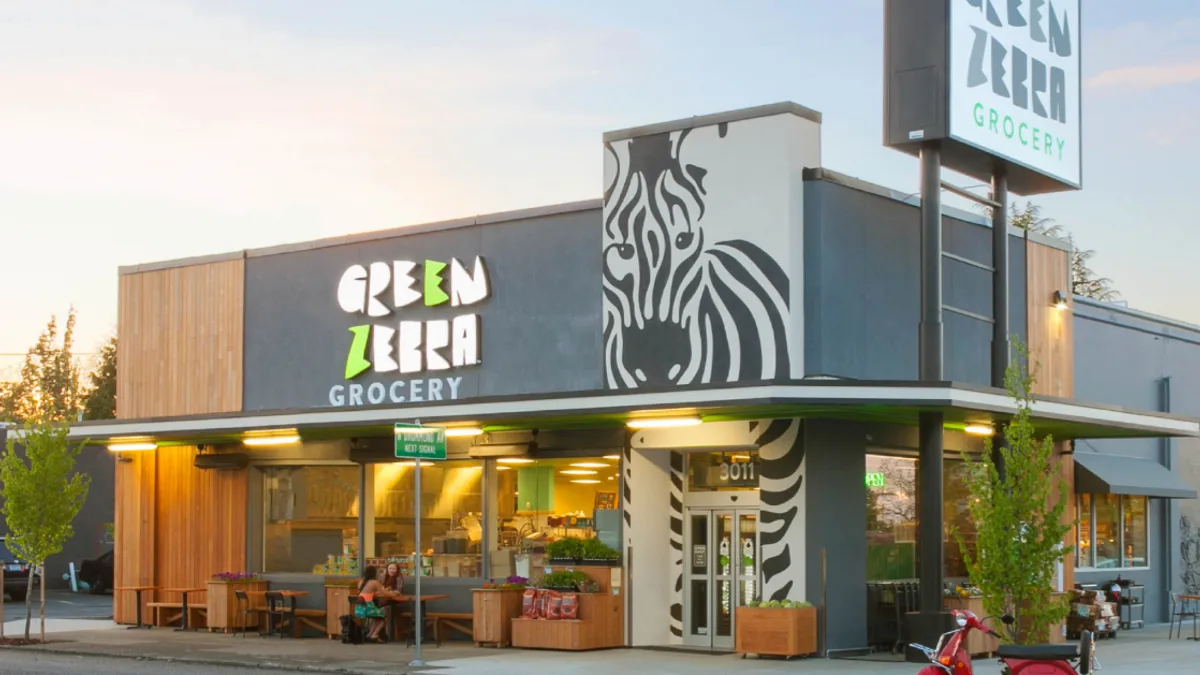Dive Brief:
- Green Zebra Grocery, an Oregon chain of healthy convenience stores, plans to expand along the West Coast in the next five years, according to The LA Times. There are now three stores in the Portland area with a fourth currently under construction.
- Lisa Sedlar, the store's founder and former president of New Seasons Market, has raised almost $9 million for the expansion, including nearly $400,000 of her own money. Sedlar told the L.A. Times that she plans to build two dozen locations reaching from Southern California to Seattle over the next five years, but could open as many as 100 stores.
- A typical Green Zebra store is about 5,000 square feet and is stocked with an array of health and specialty products — from kombucha on tap to fresh produce. Green Zebra’s inaugural store raked in $4 million in revenue in 2014 and the company is on pace to hit $12 million this year.
Dive Insight:
Green Zebra is taking a risk by going all in with this rapid expansion, hoping that its colorful, one-of-a-kind healthy convenience stores will win consumers over across the West Coast. Although this expansion will come at a high cost, the owner and its investors want Green Zebra to redefine convenience stores.
Stocked with a range of better-for-you and gourmet products, this store has carved out a loyal following in the Portland market — an area that's at the bleeding edge of specialty food trends. Now, Sedlar and her team are hoping that free-range chicken sausage, on-tap kombucha and other Green Zebra specialties will resonate with consumers outside of the foodie haven, too.
Research indicates this is a solid bet. For instance, while Portlanders drink more kombucha than residents of any other city in America, according to Well + Good, sales data also shows consumers across natural and conventional channels are drinking kombucha at a growing rate. Meanwhile, a study of more than 12.5 million social media posts and other online commentaries by millennials during the past year, conducted by CBD Marketing, found that millennials prefer healthy and natural foods.
Green Zebra is also tapping into the desire for smaller stores that is fueling the growth of Aldi and Lidl, not to mention smaller formats from the likes of Target, Whole Foods and Meijer. Shoppers are increasingly making needs-based trips as opposed to stock-up visits. Nielsen recently reported that 25% of fast-moving consumer goods sales come through small stores, while 70% of shopping trips go to these locations.
Sedlar is taking aim at a $237 billion c-store industry with a chain of small shops that improve the health of neighborhoods. But this growth plan will be pricey. The cost to open a store is about $1.5 million, mainly because of the high cost of refrigeration equipment. Green Zebra is also eyeing growth in hotly contested urban markets that are no stranger to specialty competitors.
Sedlar's extensive experience leading different grocers shows how well she knows the industry and that will help her with expansion. Before starting Green Zebra, the 52-year-old founder was president and CEO of New Seasons Market, director of purchasing at Whole Foods Market and vice president of sales and marketing at Pharmaca in Boulder, Colorado. She stepped down as chief executive of independent grocer New Seasons Market in 2012 to launch Green Zebra Grocery.
If the store can continue to hook shoppers at these new locations, then it could be a hit. Jeff Lenard, a spokesman for the National Association of Convenience Stores who has toured the groceries, told The L.A. Times what “Green Zebra does exceptionally well is they deliver on the experience.” Although small grocers can’t compete with massive chain competitors on price and selection, many are succeeding with niche products and good customer service. A unique experience and specialty health products could be what makes Green Zebra stand out in a competitive grocery market.













